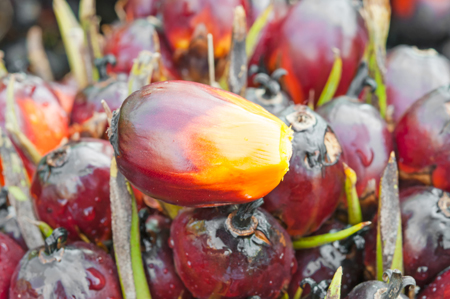 (Agrimoney) – Olam International revealed it was “generally bearish” on the palm oil market, citing the prospect of production rebounds, as the cocoa-to-diary trader revealed a rise in earnings, helped by “opportunistic” business in grains.
(Agrimoney) – Olam International revealed it was “generally bearish” on the palm oil market, citing the prospect of production rebounds, as the cocoa-to-diary trader revealed a rise in earnings, helped by “opportunistic” business in grains.
Sunny Verghese, the Olam founder and chief executive, acknowledged that the revival in South East Asian palm oil output, from 2016 levels depressed by dryness, had been “slightly lower than what I anticipated”.
Last week, official data showed Malaysian palm oil production reaching 1.59m tonnes in April – 19.0% higher year on year, but some 45,000 tonnes below market expectations.
However, Mr Verghese forecast nonetheless an increase of some 2.7m tonnes in output in Malaysia, the second ranked producing country, an estimate he said was “probably at the top end of the range of consensus forecasts.
“We expect a fairly strong pick-up from second quarter onwards,” he told investors, foreseeing Malaysia’s total output this year at about 20m tonnes.
‘Generally bearish’
For Indonesia, the top palm-producing country, Olam was forecasting a rise of some 3.6m-3.7m tonnes in production, to about 34.8m tonnes, a figure it said it actually at the lower end of market expectations.
With the extra supplies, “we are generally bearish on the palm oil market as a result of the fundamental recovery in crude palm oil production, both in Malaysia and in Indonesia,” he said.
Mr Verghese, asked about his forecast for palm oil prices this year, said that “our range is somewhere between 2,200 to 2,700 ringgit a tonne”, as measured in the Kuala Lumpur futures market, where the benchmark July contract closed on Monday up 1.2% at 2,684 ringgit a tonne.
Besides production prospects, he said that forecast also factoring in potential for currency moves, export levy rates and increased use of the vegetable oil in Indonesia for making biodiesel – as well as “US biodiesel policy”.
Washington officials earlier this month said that Indonesia, and Argentina, were exporting biodiesel to the US at prices artificially depressed by subsidies – a finding deemed likely to herald large US import subsidies on imports of the biofuel from the two countries.
Cashing in on cashews
Mr Verghese’s comments came as Singapore-based Olam, one of Asia’s biggest agricultural commodity traders, unveiled earnings up 27% at Sing$143.9m for the January-to-March period, on revenues up 22% at Sing$5.80bn.
Profits growth was particularly strong in the group’s edible nuts and spices division, in which earnings before interest, tax, depreciation and amortisation (ebitda) soared 72 to Sing$138.0m.
“Almonds did better as volumes grew and prices improved well over the prior first quarter, and remained steady,” the group said.
“The cashew business enjoyed favourable market conditions, which supported its volume and margin growth during the quarter.”
‘Opportunistic grain trading volumes’
The food staples division achieved a 28% rise to Sing$118.3m in ebitda, an increase of which the group’s grains division “was a key driver.
“Both origination and trading as well as its wheat milling operations in West Africa continued to deliver growth.”
Indeed, Olam said that “opportunistic trading volumes in grains” had been behind a 51% surge year on year in the group’s overall trading volumes.
Coffee vs cocoa
In the group’s confectionery and beverages division, coffee showed growth in trading volumes and ebitda too, with a “better contribution from both green coffee supply chain and trading as well as the soluble coffee businesses”.
However, the division reported a 29% drop to Sing$75.0m in ebitda, thanks to a worse performance in cocoa, blamed on volatility in prices, which have over the past year lost roughly one-third of their value on New York’s futures market, undermined by increased supply hopes.
“Cocoa supply chain and trading, on the other hand, faced significant headwinds and margin pressures due to sharp market movements in late 2016 and early 2017,” Olam said.
‘Tough year for cocoa’
Shekhar Anantharaman, the Olam chief operating officer, underlined that the cocoa decline was related to the trading operations, rather than the processing business bought two years ago from Archer Daniels Midland for $1.2bn – although with the purchase price now the subject of a dispute between the two groups.
“The processing assets that we acquired from ADM, the business has done quite well last year. And in the first quarter also, the business has been quite stable,” Mr Anantharaman said.
However, the drop in cocoa price tumbled “has cost, obviously, liquidity in the marketplace.
“That has impacted the supply chain and trading part of the business,” he said, adding that “it will be a tough year for cocoa”.




